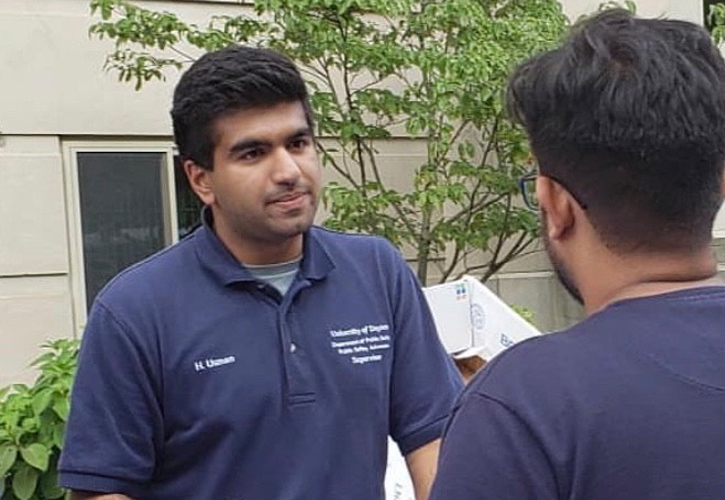College of Arts and Sciences Newsroom

University of Dayton criminal justice student writes law enforcement guide on engaging with Muslim communities
By Allison Brace '22
University of Dayton junior Huthayfa Usman created a reference guide for law enforcement to use when engaging the Muslim community. He hopes his guide, which provides basic information about Muslim culture, helps to build trust between community members and police.
The guide, which has been distributed to the University's Department of Public Safety and the Centerville, Ohio, Police Department, focuses on the practices of Islam and the need for understanding between the Muslim population and law enforcement agencies.
“The guide showcases very specific cultural differences that are present within Muslim communities,” said Usman, a criminal justice studies major from Beavercreek, Ohio, who plans to pursue a career in law enforcement after graduation. “Through my research I have learned that if law enforcement offends a community it is harder for the police to get the answers that they are looking for, which is why it is important to build this mutual trust.”
Usman, who is also pursuing minors in Arabic and Middle Eastern and Islamic studies, is president of the University Muslim Student Association. He also has been director of the UD public safety advocate program since his freshman year.
Usman sought assistance from the Islamic Center of Centerville which includes as part of its mission educating the community about the Islamic faith to give people a greater understanding of the religion.
“Huthayfa's work pertaining to The Law Enforcement's Guide on Policing Muslim Communities is an original idea that proves Huthayfa's far-sightedness, citizenship, his service to his community and his appreciation for law and order,” said Yasar Khan, instructor at the Islamic Center of Centerville. “Through his amazing efforts he is bridging the gap between the law enforcement officers and the Muslim community by providing the basic Islamic fundamentals. His work promotes preventative measures, understanding and mutual respect. We hope that this will become an example for different communities across the country.”
The project took three months and helps advance the University’s diversity, equity and inclusion mission for the campus and Dayton-area Muslim communities.
“The idea for this project started off with the social and racial justice events that took place this summer, where misunderstandings occurred between law enforcement and citizens,” Usman said. “There was a lack of common ground between them for a variety of reasons, which is why I started out with a goal to make a guide for all minorities. However, after further consideration, I decided to narrow it to a group with which I had personal knowledge.”
Usman was grateful to Martha Hurley, professor and criminal justice studies program director, and Savalas Kidd, executive director of public safety and chief of police, for their helpful feedback on the project.
“I appreciate the initiative shown by Huthayfa in working with the Islamic Center of Centerville to increase cultural sensitivity and foster greater understanding between local police and the Muslim community,” Hurley said.
In addition to campus and Centerville police, five other police departments will receive the guide. Usman hopes the guide can be used as a resource for a variety of public safety agencies, including EMS and firefighters.
In the future, Usman hopes more minority groups will create similar guides to help law enforcement engage with them more respectfully and effectively. Building diversity and understanding within the law enforcement community could have a large impact on the police agencies throughout the nation.
“In the grand scheme of things, I hope that law enforcement agencies will reach out to their local mosques in an effort to build relationships and promote diversity within the field of law enforcement,” Usman said. “By reaching out to make connections, giving them a tour of the station or even being present in mosques and other Muslim community groups, law enforcement officers can build relationships and mutual understanding of one another which would benefit society.”
For more information, visit the University of Dayton Criminal Justice Studies program website and click here for the Law Enforcement’s Guide on Policing Muslim Communities.
